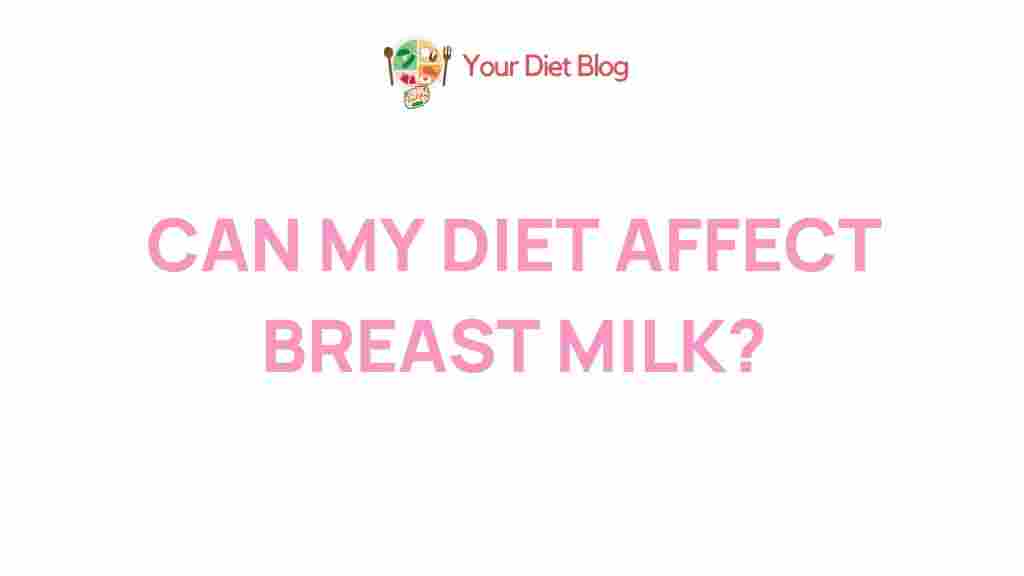The Role of Diet in Breast Milk Composition
Breastfeeding provides numerous benefits for both infants and mothers, but did you know that the composition of breast milk is influenced by what the mother eats? The link between a mother’s diet and the nutritional quality of her milk is crucial for ensuring optimal health and development for the baby. Understanding this relationship can help new mothers make informed dietary choices that directly benefit their infants’ growth and well-being.
What Is Breast Milk Made Of?
Breast milk is a complex fluid composed of various nutrients, including proteins, fats, carbohydrates, vitamins, and minerals. These components are essential for the baby’s development, supporting their immune system, promoting brain growth, and providing energy. The composition of breast milk changes over time to meet the infant’s evolving needs, but it is also influenced by the mother’s diet.
How Does Diet Impact Breast Milk?
The nutrients in a mother’s diet are absorbed into her bloodstream and passed into breast milk. However, not all foods affect breast milk in the same way. While some components, like protein and fat, are more easily transferred into milk, others, such as vitamins, minerals, and trace elements, are impacted by both the quality and quantity of a mother’s food intake.
Key Nutrients Affected by Diet
- Fat: The fat content in breast milk is essential for brain development. A diet rich in healthy fats, such as omega-3 fatty acids from fish, can increase the levels of these fats in milk.
- Proteins: Protein intake is important for the baby’s growth. However, high-protein diets may affect milk protein levels, potentially impacting digestion.
- Carbohydrates: Lactose, the primary carbohydrate in breast milk, is influenced by the mother’s overall carbohydrate intake, though the body typically maintains stable lactose production regardless of diet.
- Vitamins and Minerals: The availability of vitamins like A, D, and B12, as well as minerals like calcium and iron, can be affected by a mother’s diet, potentially impacting the baby’s health.
Step-by-Step Guide: Optimizing Your Diet for Better Milk Quality
To maximize the benefits of breastfeeding for your baby, it is important to optimize your diet. Here is a simple step-by-step guide to help you ensure your milk is nutritionally rich and beneficial:
- Eat a Balanced Diet: Incorporate a variety of fruits, vegetables, whole grains, lean proteins, and healthy fats into your meals. A well-rounded diet provides the essential nutrients needed for optimal breast milk production.
- Focus on Healthy Fats: Include omega-3-rich foods such as salmon, chia seeds, and walnuts to promote brain development in your baby.
- Stay Hydrated: Drink plenty of fluids throughout the day. Breastfeeding requires additional water intake, and staying hydrated ensures the proper production of breast milk.
- Include Iron-Rich Foods: Foods like spinach, beans, and lean meats can help prevent iron deficiency, which is essential for both mother and baby.
- Take Necessary Supplements: Depending on your diet, you may need supplements, such as vitamin D, B12, or folic acid, to meet the nutritional needs of breastfeeding.
Common Diet Mistakes to Avoid While Breastfeeding
While optimizing your diet is crucial, there are also some common dietary mistakes that breastfeeding mothers should avoid:
- Skipping Meals: Skipping meals can affect your energy levels and milk production. It’s important to eat regularly and include nutrient-dense snacks.
- Excessive Caffeine: High caffeine consumption can lead to irritability in both mother and baby. Limit your caffeine intake to 1-2 cups per day.
- Not Getting Enough Protein: Protein is essential for milk production, so be sure to include adequate amounts in your meals.
- Over-Processed Foods: Highly processed foods, rich in added sugars and unhealthy fats, can negatively affect the quality of breast milk.
Understanding Common Myths About Diet and Breast Milk
There are many myths surrounding diet and breastfeeding. Let’s clear some of them up:
- Myth: Eating spicy foods can cause your baby to become fussy.
Fact: There is no scientific evidence to support this claim. However, if you notice your baby becoming gassy or uncomfortable after certain foods, it may be worth adjusting your diet. - Myth: You need to eat twice as much while breastfeeding.
Fact: While breastfeeding does require extra calories, the increase is not as drastic as doubling your food intake. Aim for an additional 300-500 calories per day.
Tips for Maintaining a Healthy Diet While Breastfeeding
It can be challenging to maintain a balanced diet, especially for new mothers. Here are some tips to make the process easier:
- Meal Prep: Prepare meals ahead of time to ensure you have healthy options available even on busy days.
- Snack Wisely: Keep healthy snacks like nuts, yogurt, and fruit handy to avoid reaching for unhealthy alternatives.
- Monitor Food Sensitivities: Pay attention to any foods that may cause discomfort for your baby and adjust your diet accordingly.
What to Do If You’re Not Sure About Your Diet
If you’re unsure about whether your diet is sufficient or you have concerns about breast milk quality, consider consulting a healthcare provider or a registered dietitian. They can help you create a personalized nutrition plan to support both your health and your baby’s needs.
Conclusion: The Ultimate Connection Between Diet and Breast Milk
In conclusion, a mother’s diet plays a significant role in the composition and quality of her breast milk. By making mindful food choices, staying hydrated, and prioritizing nutrient-dense foods, mothers can help ensure that their babies receive the best possible nutrition. The relationship between diet and breast milk is a fascinating area of study that continues to highlight the importance of nutrition during the breastfeeding journey. A well-balanced diet isn’t just beneficial for the mother—it’s the ultimate way to promote the health and growth of the infant.
For more information on breastfeeding and infant nutrition, visit this resource. You can also check out other helpful articles about diet and health at our blog.
This article is in the category Nutrition Basics and created by YourDiet Team
